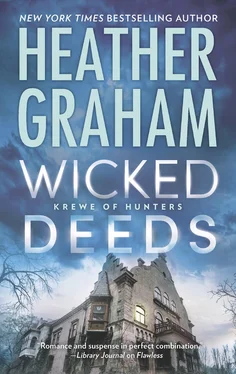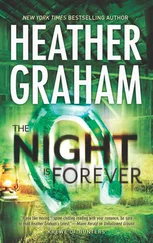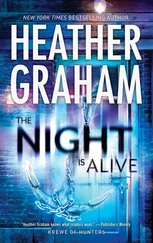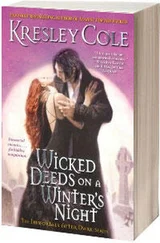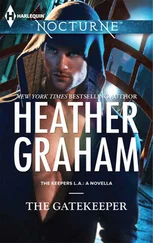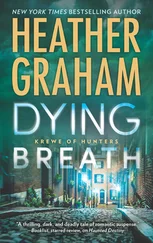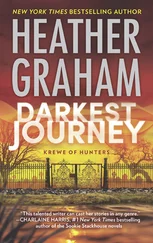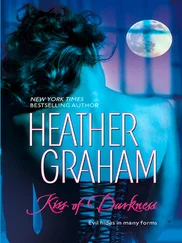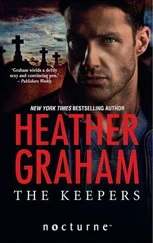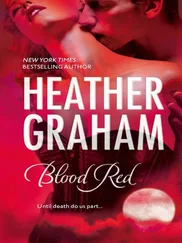It wasn’t that way for Vickie.
She loved history. She’d been a guide, leading youth-group tours as a historian, and she was an author of history books. She was proud to say that she was good at it—the most important reviews to her were the ones that said she had a way of making history fun for the reader.
It was only the cases with which she had recently become involved that had made her want to veer in a new direction. Not a change—an addition. There had been a case in which an incarcerated serial killer had managed to reach out to strike again, and then another where modern-day Satanists had tried to bring the devil back to Massachusetts.
She was now determined to do her best to become an agent herself, and it was a decision with which she was really pleased. It was odd to realize that she had once been embarrassed by her secret talent—the ability to speak with the dead. She hadn’t wanted to admit that it could be real. But she’d learned recently that her so-called curse allowed her to actually make a difference. She might have the ability to help in more bizarre cases—to save lives. And that mattered. To that end, she’d applied for and been accepted to the academy at Quantico. The Krewe might be a special unit, but even so, the agents were required to go through the academy. Vickie had passed the necessary tests on paper and made it through the grueling physical regimen necessary to become an agent.
Griffin already had an apartment in a wonderful old row house in Alexandria. For him, it wasn’t a move—just a return to his home of the past several years. He had only been back in Boston—where he and Vickie both were born and raised—on assignment.
Vickie had gone to college at NYU and then lived in New York for several years, but never farther south.
It was, she’d assured him, exciting to move.
But she was aware that Griffin believed it had to be a tug on her heartstrings as well—she was leaving a lot behind.
And she was. But she was also happy to be moving forward.
“A nightmare?” he repeated, and the note of worry seemed higher.
She smiled, staring into his dark eyes. Griffin was fine with her decision to become an agent; the Krewe was composed of both men and women, and he knew women were every bit as efficient and excellent as agents as men.
It was just her—but of course, he loved her. It wasn’t going to be easy for him to accept her walking into the same danger he did daily. He would, however, get used to it—and she loved him all the more for that fact.
“No, not a nightmare!” she told him. He far too quickly became concerned for her. All it had been was a bizarre dream. It might well have been due to the way they’d overindulged in some delicious blue crabs at dinner last night.
She would stay mum. For the moment. After all, she was in Baltimore. Edgar Allan Poe was buried here; he’d died here. Having dreams about him didn’t seem the least bit strange, actually.
But for the moment...
“It was a dream, and rather a cool one. I was walking around Baltimore...”
“We’re in Baltimore, so that seems...normal, maybe?”
She grinned, rolling onto an elbow to better face him—he’d already gotten up and showered and dressed for the day. He was an early riser—alert and ready to face the world as soon as he opened his eyes.
Vickie...not so much! But she was getting used to early mornings.
“Perfectly normal,” she told him. “It wasn’t a nightmare. It was just a dream. About beautiful old Baltimore—hey, it’s an important city, right? And we are going to go and do some cool things today, aren’t we?”
“Absolutely,” he promised. “Fort McHenry, the Inner Harbor, Federal Hill—”
“Don’t forget the aquarium!” she said.
“I wouldn’t dream of it. But I thought we might want a full day for that. We can do whatever you choose, my love. Anything you would like.”
“You’ve done it all too many times before?” she asked him.
He laughed. “No. I mean, I have done it all before, but not with you, so it’s as if it’s the first time, right?”
“That is an incredibly good suck-up line if I have ever heard one!” she assured him.
She thought that the line might take them somewhere, but he smiled and stepped away from the bed.
“I just have a couple of hours of work first,” he said.
“What?”
“Work. But there’s not much involved at the moment, and not much I can do.” He added quietly, “Franklin Verne—you know who he is?”
“Yep. I’m living and breathing and have ears and eyes. You can’t miss him. What about him?”
“He died last night.”
“Oh, that’s too bad—terribly sad! I’ve seen him speak. I mean, I write nonfiction and he writes fiction, but I’ve been at a number of conferences where he’s been a speaker on a panel. He was charming and very funny...helpful, giving. He’s actually written some historical fiction, and while Verne tended toward horror—some action, some sci-fi and some mystery—he was a wonderful researcher as well.”
“Always the writer!” he teased.
“That’s not going to be a problem, is it?” She’d spoken with other agents and she believed that—assuming she did make it through the academy—she’d still be welcome to write on her own time. It seemed that Krewe agents were, in fact, encouraged to keep up with any previous pursuits.
“It’s fine!” he assured her quickly.
“So what happened to Franklin Verne? I know that he was ill a few years ago—in fact, he joked about it sometimes when he spoke, saying that his wife taught him how to have fun and not be totally boring without a dip in a whiskey vat.”
“Yes, I had heard that he was supposedly as clean as a newborn babe.”
“Supposedly?”
“He was found dead in a wine cellar.”
“In a wine cellar—he didn’t have a wine cellar. I don’t think he even drank wine. When he did drink.”
“Not his wine cellar. But how do you know he didn’t have a wine cellar?”
“He was very open about his health problems, about his wild days—and his love for his wife,” Vickie said. “So, if not his own wine cellar—where then?”
“The Black Bird.”
“What?”
“Amazing. That was my exact reaction when Jackson told me. Want to come with me? I’m on my way there now. Heading off to kowtow to a local cop named Carl Morris.”
Vickie rolled out of bed. “Ten minutes,” she told him.
He nodded; he knew she was telling the truth.
* * *
Vickie and Griffin had both thoroughly enjoyed the Black Bird the night before; the service had been wonderful and the food had been delicious.
Vickie had especially like the decor; the building was 1820s Federal style, and the restaurant had the first two floors and the basement of the building while the remaining three floors above were given over to office space. Upon entering a long hall of a foyer with exposed brick walls and plush red carpeting, you came to the hostess stand. From there it went through to the bar area.
The bar was lined with portraits of Poe and his family; there were framed posters of quotations and more, all having to do with Edgar Allan Poe.
Stairs led from behind the bar to several sections of seats and a few party rooms of various sizes. The main dining room was the first floor, and tables and booths were surrounded by bookshelves.
Of course, not even the master could have written enough to fill the restaurant’s shelves; it was an eclectic mix of secondhand novels. The venue had charmingly been planned on the concept that every diner was welcome to take a book, and, naturally, you were welcome to leave a book or books as well.
New editions of Poe books were sold in the gift shop, which was conveniently on the way out, at the back of the restaurant. Of course, one could leave through the front door, but the bookshop was like a minimuseum, and Vickie sincerely doubted that many people ignored it. Their waiter—he’d introduced himself as Jon—told them that though the restaurant was comparatively new, they attracted a lot of local, repeat clientele, for which they were very grateful. But locals didn’t tend to shop for souvenirs, unless they were entertaining out-of-town friends. Since they were happily playing tourist, Vickie and Griffin made sure to visit the shop. Lacey Shaw, the woman working the little boutique, was a bit of a Poe aficionado, and she assured them that even the locals loved to come in and chat.
Читать дальше
